Common Signs and Symptoms of Dehydration

Dehydration occurs when the human body loses more fluids than it takes in, impairing normal body functions. It is a pervasive health concern, especially during hot and humid weather when body fluid is lost through perspiration. The risk of dehydration increases significantly for people with chronic illnesses, older adults, and young children, who might need immediate medical attention to avoid serious complications such as kidney failure and low blood pressure. Recognizing the signs and symptoms of dehydration and understanding how much fluid intake is necessary are crucial to prevent dehydration and its repercussions.
1 Signs and Symptoms of Dehydration
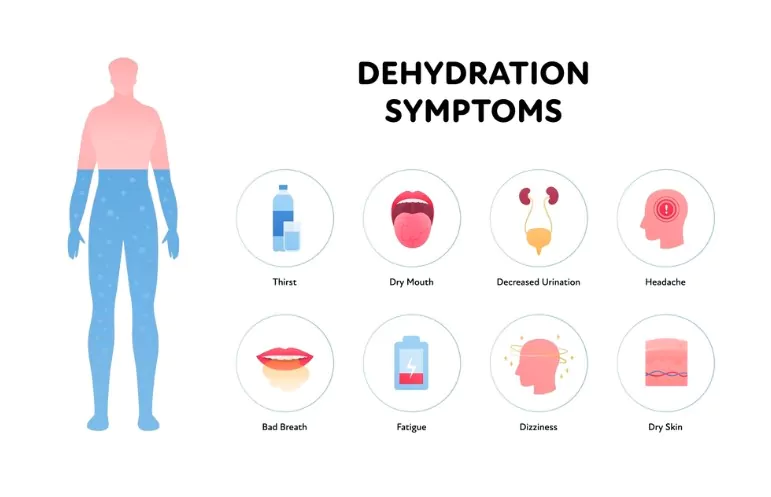
Dehydration manifests through various signs and symptoms, ranging from mild to severe. Mild dehydration can typically be treated by drinking fluids, but severe dehydration requires immediate medical treatment, including hospital treatment with IV fluids.
Mild Dehydration
Dry Mouth: The earliest sign of dehydration is often a dry, sticky feeling in the mouth.
Few or No Tears: When dehydration is beginning, you might notice fewer or no tears when crying.
Decreased Urine Output: Fewer wet nappies in infants or less frequent urination in adults is a sign of mild dehydration.
Mild Dehydration
- Dry Mouth: The earliest sign of dehydration is often a dry, sticky feeling in the mouth.
- Few or No Tears: When dehydration is beginning, you might notice fewer or no tears when crying.
- Decreased Urine Output: Fewer wet nappies in infants or less frequent urination in adults is a sign of mild dehydration.
Moderate Dehydration
- Sunken Soft Spot: In infants, the soft spot on the top of the head may appear sunken.
- Dry Skin: The skin may appear slightly shrivelled and lack elasticity.
- Dizziness: A reduction in blood volume from fluid loss can lead to low blood pressure and dizziness.
Severe Dehydration
- Confusion and Irritability: Severe dehydration can impact cognitive functions, leading to irritability and confusion.
- Rapid Heartbeat and Breathing: As the body works overtime to maintain function, it can result in increased heart and breathing rates.
- Fainting: Severe loss of fluids can lead to extremely low blood pressure, causing fainting.
In hot and humid weather, it is imperative to drink fluids regularly to replace lost fluids and avoid the risk of heat exhaustion or even more severe heat injury.
When someone experiences severe dehydration symptoms, they should seek immediate medical attention. Without prompt medical treatment, severe dehydration can lead to life-threatening conditions, such as heat injury, kidney disease, and heat exhaustion.
2 Risk Factors and Vulnerable Groups
Certain individuals and conditions present a greater risk of experiencing dehydration. These include:
- Young Children and Infants: They have a higher risk due to their lower body weight and higher turnover of electrolytes and water.
- Older Adults: They might not drink enough fluids due to a diminished sense of thirst or physical inability to drink.
- Chronic Illnesses: People with chronic illnesses like diabetes and kidney disease are at higher risk.
- Hot and Humid Weather: It leads to increased sweating, requiring a higher intake of fluids to replace lost fluids and avoid dehydration.
- Physical Activity: Exercising in hot and humid conditions increases fluid loss through sweat.
- Taking Water Pills: People using diuretics or water pills are at a higher risk.
3 Diagnosing Dehydration
Dehydration is diagnosed through a combination of physical exams, blood tests, and evaluating symptoms of dehydration. A thorough physical exam includes checking blood pressure, heart rate, body temperature, and kidney function. Blood tests are critical to assess electrolyte levels, especially when severe dehydration is suspected.
4 Treating Dehydration
Treating dehydration involves replacing lost fluids and electrolytes. Mild dehydration can be addressed by drinking fluids like water, fruit juice, and oral rehydration solutions. In contrast, moderate dehydration might necessitate more focused efforts, including drinking sports drinks containing electrolytes and oral rehydration solutions.
Mild Dehydration
Increasing fluid intake by drinking water, and other fluids like fruit juice, and eating water-rich fruits and vegetables can be sufficient for mild cases. Individuals should drink fluids regularly, even before they feel thirsty, especially in hot and humid weather.
Moderate Dehydration
People experiencing moderate dehydration should drink extra fluids and consider oral rehydration solutions that contain the right balance of salts and sugars to replace lost fluids effectively. Sports drinks can also be beneficial, as they contain electrolytes that help maintain blood pressure and muscle function.
Severe Dehydration
Severe dehydration is a medical emergency requiring immediate medical attention. In such cases, hospital treatment with IV fluids is usually necessary to replace fluids quickly and avoid low blood volume and other serious complications.
5 Preventing Dehydration
Preventing dehydration primarily involves drinking fluids proactively and ensuring adequate fluid intake, especially for people with higher risk factors like young children, older adults, and those with chronic illnesses.
- Drink Regularly: Individuals should drink water and other fluids regularly, even if they don’t feel thirsty, to replace lost fluids and maintain body fluid balance.
- Monitor Fluid Loss: Paying attention to signs of fluid loss like fewer bathroom breaks and dark urine can help in adjusting fluid intake.
- Consume Water-Rich Foods: Including water-rich foods like fruits and vegetables in the diet can contribute to overall fluid intake.
- Avoid Alcohol and Caffeine: These can increase urine output, leading to a quicker loss of fluids.
- Adjust Fluid Intake during Physical Activity: Drinking extra fluids before, during, and after exercise helps in maintaining the electrolyte levels and avoiding muscle cramping.
6 Special Considerations for At-risk Populations
Older Adults
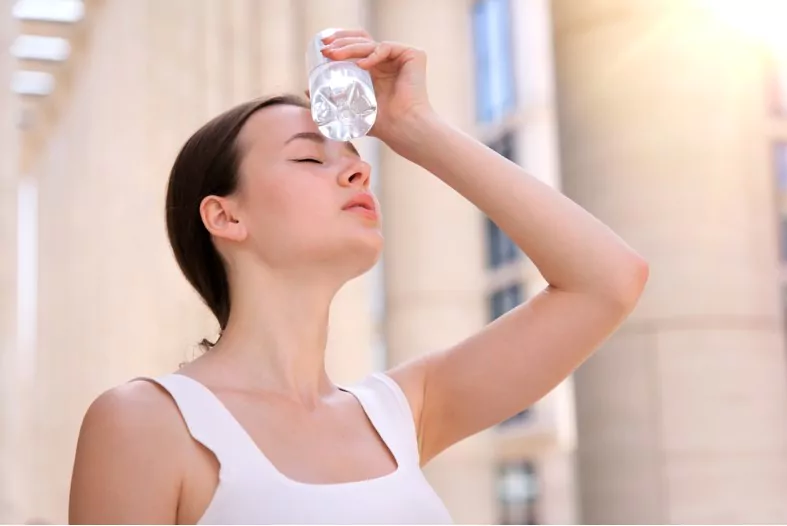
With advancing age, the human body’s ability to conserve water is reduced, and the sense of thirst becomes less acute. Older adults should hence drink water regularly and be mindful of their fluid intake, especially those on blood pressure medications.
Young Children and Infants
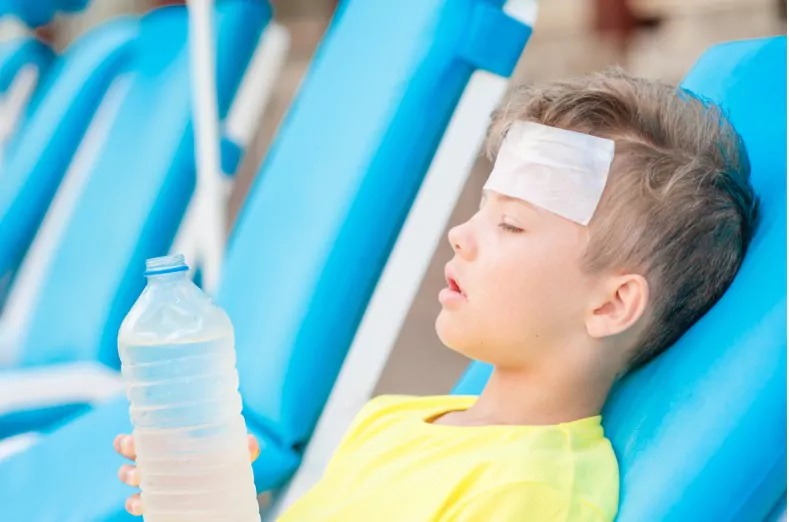
Infants and young children are particularly susceptible to dehydration. Parents should monitor the number of wet diapers or nappies and ensure that children are drinking enough fluids, especially during hot weather.
Individuals with Chronic Illnesses
People with chronic illnesses like kidney disease need to be vigilant about their fluid intake and regularly monitor for signs of dehydration, like changes in urine color and frequency. They may also need to adjust their fluid intake based on their medical treatment and medication, like insulin for diabetes, which can increase the risk of dehydration.
7 Impact of Dehydration on Body Functions
Blood Pressure and Volume
A reduction in body fluid impacts blood volume, leading to low blood pressure. The heart has to work harder to pump blood, affecting the overall circulatory system and potentially causing dizziness and fainting.
Body Temperature
Fluids are essential in maintaining body temperature. Dehydration may increase body temperature, escalating the risk of heat-related illnesses, especially in hot and humid weather.
Kidney Function
The kidneys regulate fluid balance in the body. Chronic dehydration can lead to kidney stones and, in extreme cases, kidney failure.
8 Diagnosing and Treating Dehydration
A physical exam might be conducted to diagnose dehydration to check blood pressure, heart rate, and kidney function, among other things. Blood tests may also be done to determine electrolyte levels and how well the kidneys are functioning.
Mild to Moderate Dehydration Treatment
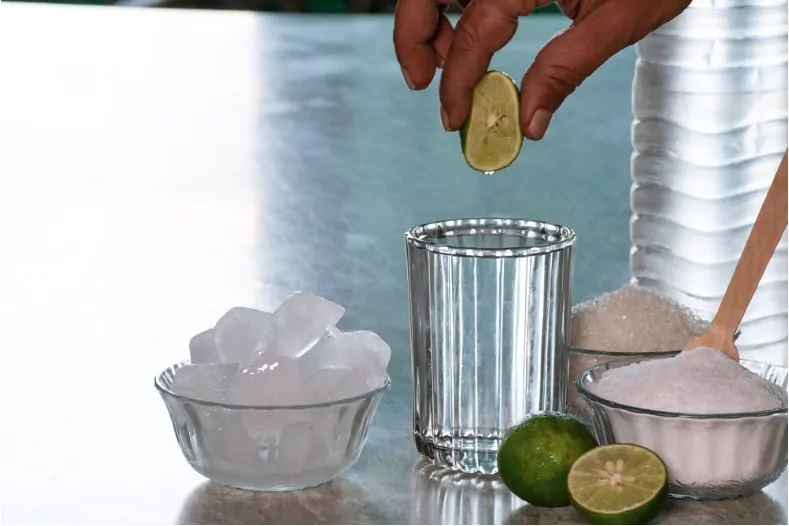
Drinking Fluids: For most people experiencing mild to moderate dehydration, drinking fluids is usually enough to treat dehydration. This includes water, fruit juice, and sports drinks which can help in restoring the body’s fluid balance.
Oral Rehydration Solutions: These are specially formulated to replace lost fluids and electrolytes and can be particularly effective.
Severe Dehydration Treatment
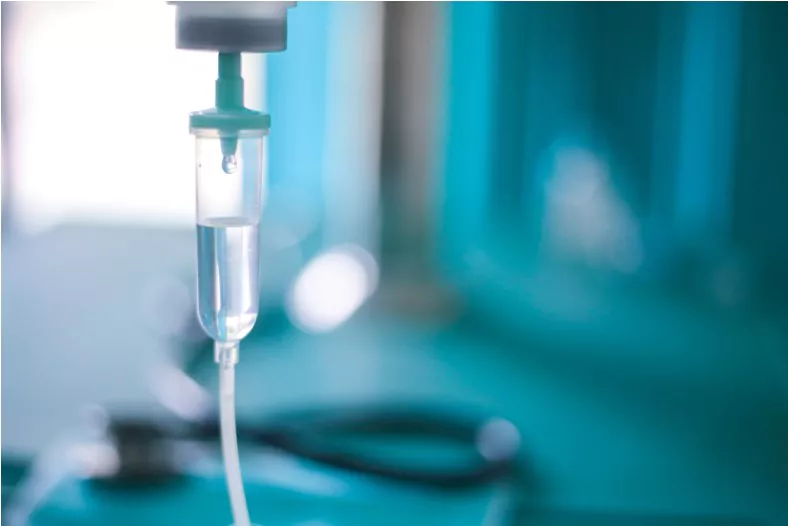
IV Fluids: Those who are severely dehydrated may need immediate medical treatment, often in the form of intravenous (IV) fluids, to rapidly replenish body fluid levels.
Hospital Treatment: Severe cases often require hospital treatment to monitor and correct electrolyte imbalances and to address any underlying conditions causing dehydration, such as severe diarrhea.
9 Wrapping Up
Understanding the signs and symptoms of dehydration is paramount in preventing and addressing this health concern. Mild to moderate dehydration symptoms like dry mouth, thirst, and darker urine can usually be managed by drinking fluids and consuming water-rich foods. However, severe dehydration signs like rapid heartbeat, sunken eyes, and severe diarrhea necessitate immediate medical treatment, including IV fluids in a hospital setting.
Special attention should be given to at-risk populations like older adults, young children, and individuals with chronic illnesses. Regular fluid intake, proactive measures during hot and humid weather, and constant monitoring for signs of dehydration can play a pivotal role in maintaining optimal hydration levels and averting the serious complications associated with severe dehydration.
This comprehensive awareness coupled with regular hydration habits will significantly contribute to public health and individual well-being, especially in climates and conditions that pose a heightened risk of fluid loss and dehydration.
Community Q&A
About This Article
This article has been viewed 223 times.



